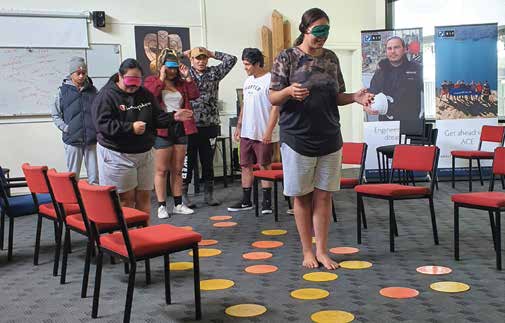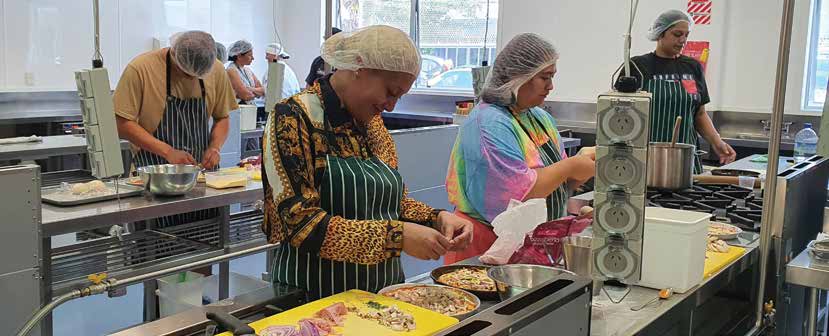
Two years ago, when MSD in Gisborne told the Eastern Institute of Technology (EIT) that there were around 300 rangatahi Not in Education Employment or Training (NEET), Jan Mogford, the EIT Tairawhiti Campus Director, decided that she had to do something about it. “Give them a taste of tertiary,” she thought. “It’s really difficult to pick a career path when you know nothing about it.”
EIT, which covers communities from Waipukurau to Ruatoria, runs a variety of programmes for rangatahi using their TEC ACE funding. Putting on these courses, however, often costs more than their ACE funding can stretch to, so they frequently collaborate with other agencies including MSD and TPK.
These three agencies organised their first series of workshops in 2020. They were to be run one day every two weeks. MSD nominated 50 rangatahi and although 30 started the programme, many of the workshops had to be cancelled because of a Covid lockdown.
For the second course 25 were invited and 15 turned up and saw the programme through to the end. This time the workshops were all held over the course of one week – a much better format, it was decided.
All the participants were aged between 18–24, and they were a mixture of young men and women.
The opening session was held at Te Whatakura, the School of Māori Studies, providing a cultural setting.
The programme included sessions on: food and beverage (a day in the kitchen, restaurant and bar – the students made fritters, salads, pizza, mocktails and dressed tables and took kai home to their whānau); Masters of Heavy Metal (a day in the Trades Block – designing and welding an outside candle holder from a sheet of metal); Operation Hydra (a day in the YMCA gym – doing orienteering, exercise, and a beep test, then learning about the Services Pathways Programme and life in the forces, as well as meeting a police dog handler and watching a demonstration); and Digital, where they got a taste of virtual reality, 3D printing and drones.
Seventeen course options fed from this five-day series of workshops.
The opening and closing sessions were facilitated by Christopher Treacher (Ngāti Kahungunu and Te Arawa), a Māori and Pasifika mentor and inspirational speaker.
Bridget French-Hall, who was amongst the team of organisers, says that what made the workshop so successful were the sessions facilitated by Christopher: “Chris really helps his audience visualize the bigger picture and he inspires in a very fun and interactive way, with lots of games and activities. At the first session, they came in shy and quiet and left feeling uplifted, laughing and talking with each other. They got to know each other really well on day one.
“He got them talking about all the barriers they face to getting into further education. They were all shouting out their barriers – having to pay for study (and for lunch and transport to get there), dependents, whānau issues… The white board was full of barriers. It was really emotional for some of them. Then Chris broke down the barriers, showing them ways to work through them. He made the barriers real and then helped them through each one.
“One of the things he got them talking about a lot, throughout the week, was the importance of getting out of bed in good time and making your bed. You set the goal, then start the day with a success, he said. At the beginning some of them were having difficulty getting to the workshop on time, but you could see them getting better and better at it. They were texting each other, offering to pick each other up.”
Christopher says that what he wants the rangatahi to understand is that they have all the answers.
“They may not know it yet, but they have. I’m not trying to teach them anything new. I just want them to see things from a different perspective.
You are the captain of your waka.
What has happened does not have to determine your future.
“When I walk in there, I see rangatahi who are possibly lacking in direction. Maybe downtrodden. One of the first things I talk about is that they are NEET – they dropped out of school, or they were kicked out. I ask them, put your hands up if that’s you. They all do, and I put my hand up too. I dropped out of school. But I tell them, it’s not your fault. Teachers were paid to engage you in education, and they failed in their job. And they open up. But the flip side of that, I tell them, is that you also chose something, and you have to take some responsibility for that. You are the captain of your waka. What has happened does not have to determine your future. I am here after a successful career in the military, and I am now running my own business.
“I also tell them, you will get some of this stuff straight away. The rest you might not get for weeks or months.”
Daljeet Cameron, who is an Employment Liaison Advisor for MSD’s Connected Service, recruited the rangatahi and was present for the workshops:
“It was amazing to see the young-people’s turnaround, just by the end of the first day. They got the message: I can do anything I want, the only thing that is stopping me is myself.
“Then the EIT gave them a mixture of everything. It was encouraging and very positive to see some girls interested in building. it was quite amazing what they ended up choosing.”
During Christopher’s session at the end the rangatahi set SMART goals.
At the end of the week two rangatahi were ready to go into further education – one into a hospitality course and another into the armed services programme.
Most importantly, Daljeet says that 80 percent of them are still working on their goals. For some it has meant going into seasonal work while they get basic qualifications like their driver licence. Some have got families that they have to support, so their goals are longer term. “We are following up with all of them. I am so grateful to EIT for hosting them for a week. We would love them to run the programme again.”
Bridget says that EIT has plans to use the TEC ACE funding to run a regular programme for NEET rangatahi.
“We knew the programme had been successful, but I wasn’t aware just how successful until we spoke with Daljeet recently. None of them knew what to do when they got there. Now all but two have goals they are working on.
“One of the rangatahi who went onto the last workshop stopped me in the street two weeks ago. She said how thankful she was to have been on the course. Without it, she said, she would have never signed up to anything because her parents hadn’t wanted her to study and incur the cost of a student loan. No one in her whānau had studied before. During the workshop Chris drew her a graph showing what she could earn if she did the food and beverage course. That changed her mind. She’s graduated now and her tutor tells me that she has got a job in a bakery.”

